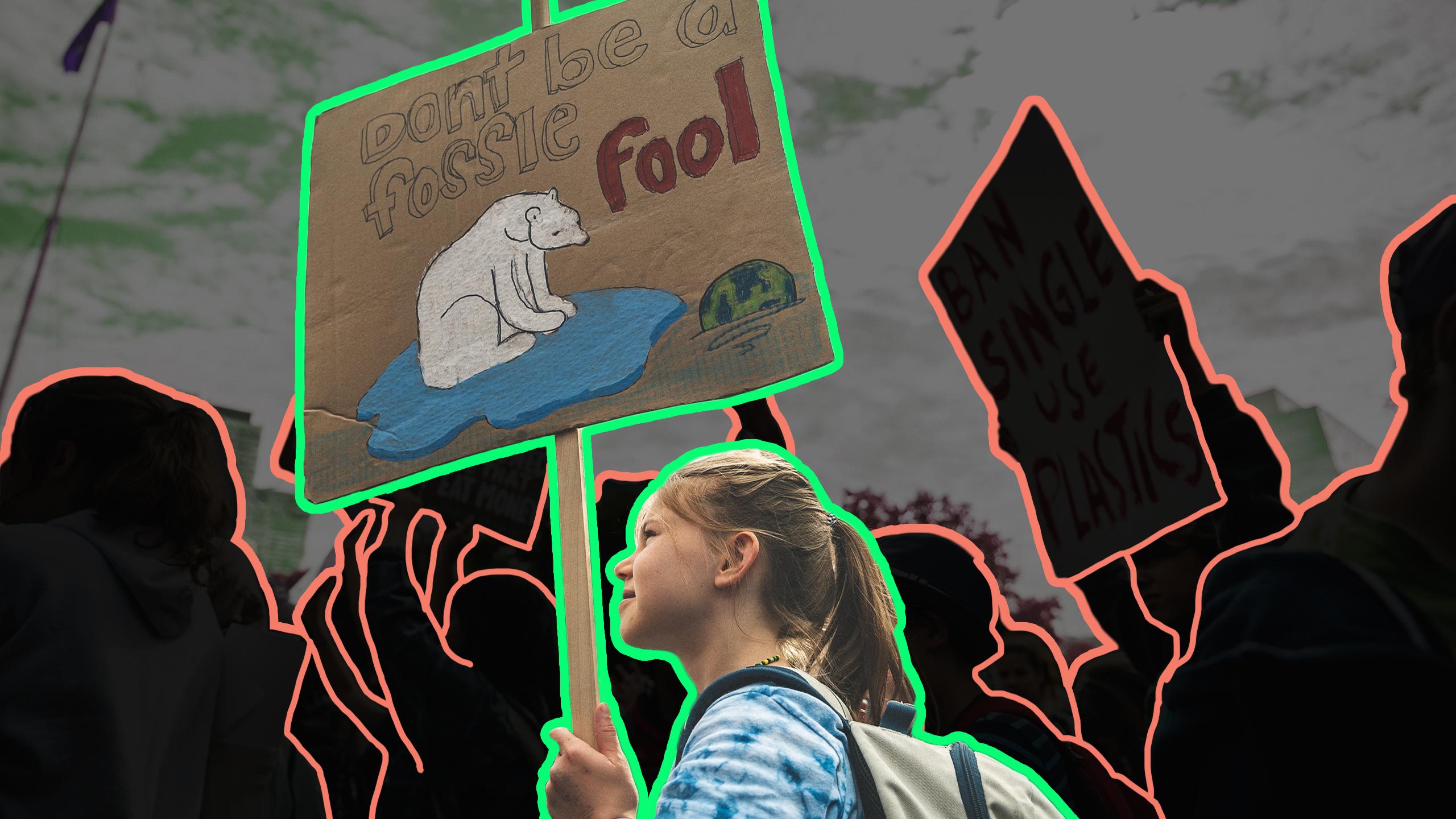Students came out in force for the day of action. Aaliyah Dasoo reports on how students can walk away from participating in a strike feeling empowered.
When she was 12 years old, Ruth Arunachalam attended her very first protest with her Grade 7 teacher and classmates. They were protesting violence in Uganda, and for Arunachalam, the best part about it was the sense of activism she felt—like she could use her voice for something bigger than herself. Now as a fifth-year mechanical engineering student, she still feels a sense of activism with protesting, which is why she chose to attend the Global Strike for Climate Justice.
On Sept. 27, thousands of Torontonians took to the streets to march for the climate strike, inspired by Greta Thunberg’s #FridaysForFuture movement. After the strike, Arunachalam felt great, but a pervasive thought crawled into her head: now that the strike has come and gone, where do we go from here?
Alienor Rougeot is the coordinator for Fridays for Future in Toronto. According to Rougeot, the September climate strike was very successful in comparison to smaller protests that had been organized within the past year. She also emphasized the importance of having different groups represented when the event is at such a large scale protest.
Since the climate strike, Arunachalam has tried to implement lifestyle changes that align with the promises she made to herself to protect the planet, such as regularly discussing climate with friends and conscious consuming. One effort she’s been working on during the past few months has been waste-free meals.
Often times with protests, it can be hard to quantify how successful something like a march is, which may leave participants wondering if they even accomplished anything. Abortion laws were brought back up to debate after the 2017 Women’s March this past year and the Dakota Access pipeline continues to operate years after its protest began. How do protesters know their work is valuable?
Rougeot says it’s important that protestors understand why they’re choosing to miss school or work to go on strike. For her, it shouldn’t be about “a cute picture with a funny sign. People mobilizing is powerful,” she says. “People should be proud of it.”
Protesting can be an effective tool, but it has to be carried out strategically in order to be successful. These success factors include: having a strong and focused message, being peaceful and non-violent and being organized to a point of tangible action.
The future of the planet is also one of the reasons Arunamachalam takes her role as a sustainability intern on campus so seriously.
“I’ve really thrown myself into my work at the Facilities Management Development,” she says. As a sustainability intern, Arunachalam evaluates the level of sustainability at Ryerson. She is currently working on a sort of tracking system that compares universities levels of sustainability. “Comparatively, Ryerson stands really well. But that makes me kind of upset because if Ryerson stands well in comparison and it’s definitely not up to my standards, what does that say about our evaluation system in general?”
Jeanne Maurer, a professor of environmental geography at Ryerson, says that as an institution, Ryerson should be more clear about how they use their money, especially when it comes to battling the climate crisis. “This raises the question: how can we make sure we’re doing enough? It’s not enough to draw the crowds for the strike and forget about it weeks later.’
Maurer says that it’s up to people to be principled and self-sufficient—particularly as city dwellers. “The answers to climate disruption are in the cities and we are the ones that are responsible for using and consuming so many resources.”
Naba Khan was “kind of underwhelmed” by the strike back in September. The second-year global health and political science student at the University of Toronto (UofT) says that everything felt like it was “very spur of the moment.”
“Let’s fight for our environment, but I’m not sure how many [protestors] left with any more of a message than what they are already passionate about enough to come to the event [for].”
Ramya Murale, a first-year urban planning student at the University of Waterloo, shares similar sentiments. When she left the strike, she “had feelings of both fulfilment and emptiness.” It was refreshing to see so many of her peers and other young people come out and support the cause, but she questions if this was enough. And she believes it isn’t. “It’s a start. But it isn’t maintaining what we are fully capable of.”
Both Khan and Murale experience eco-anxiety during times like this. “[People] consciously make decisions in order to improve our own lifestyles to fit into this ever-changing environment,” says Murale. But when it comes to the strike she says, “it was truly heartbreaking to think about the small time frame we have in order to attempt to solve these environmental problems.”
Those lifestyle changes can have a big impact. According to Maurer, we as consumers have power. “If we don’t feel that we’re as citizens [being] heard as much as we would like, I can guarantee that the marketing and the corporations listen to us,” she says. “We can do an awful lot with boycotts and with our consuming habits.”
Maurer says change must start at a grassroots level. “If we don’t do it at the local level, they’re not going to do it at the global level.”
This local-level action includes practising daily environmentalism. For Maurer, this means sourcing as much local and organic food as possible, not purchasing tea or coffee without her own reusable cup and using a car as infrequently as possible. The more principled your habits are, Maurer says, the more socially and environmentally responsible you become. “We all have to know what the hell is going on.”
Rougeot says that while feeling underwhelmed after a protest is normal, Toronto has seen some positive changes since the strike.
“People often expect that we’re all going to strike and then things are going to change the next day. Sadly, that’s not what happened, [but] I think some things have changed.”
For example, just days after the climate strike, Toronto City Council declared a climate emergency, which is something that they had been considering internally for some time. Rougeot says it’s “not random” that the city announced the declaration after seeing the number of people who came out to protest.
Additionally, Rougeot says that protesting sparks conversations, which is a smaller way of raising awareness, but “can truly work and change things.”
In terms of individual action after a massive protest, a good place to start is checking the social media of Fridays for Future. According to Rougeot, they often post calls to action shortly after an event. For example, effectively using your vote and writing your elected officials was a recommended call to action back in September as it was so close to the federal election.
Fridays for Future Toronto will be holding their next global climate strike at Queens Park on Nov. 29 and will be focused on fossil fuels and the energy transition in collaboration with Indigenous Peoples. She says the group will also be hosting more strikes throughout the next year.
Arunachalam has cared about the environment since she was a little kid. In that same Grade 7 class, she wrote a report on the Great Barrier Reef, thinking about how badly she wanted to see it, but now understands that she’ll never get the chance. She says it is really upsetting she won’t see the Great Barrier Reef as a consequence of human decisions, including the work of industrialization and engineers. “My kids aren’t going to get to learn about [the Great Barrier Reef] the way I did. They’re not going to get to see [recent] pictures of them or even satellite images of them.”
For Rougoet, fighting to save our planet and preserve our future means being an activist in everyday life, regardless if there is a huge upcoming protest. “You can be enough in every part of your life and that doesn’t mean having a megaphone in front of Queen’s Park,” says Rougeot. “It just means advocating for something you believe in every day.”













Iqra
Wow. Really informative. Left me quite empowered if I do say so myself.